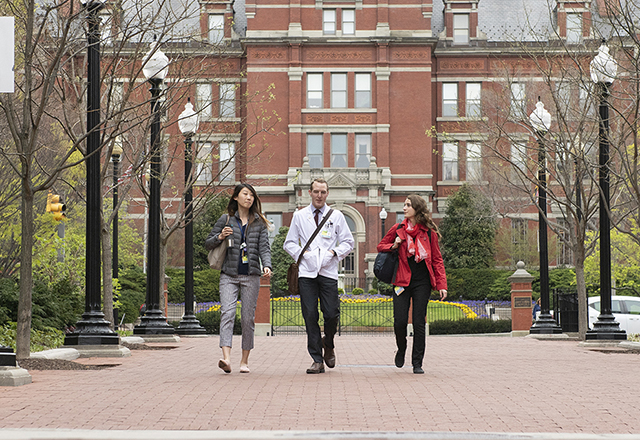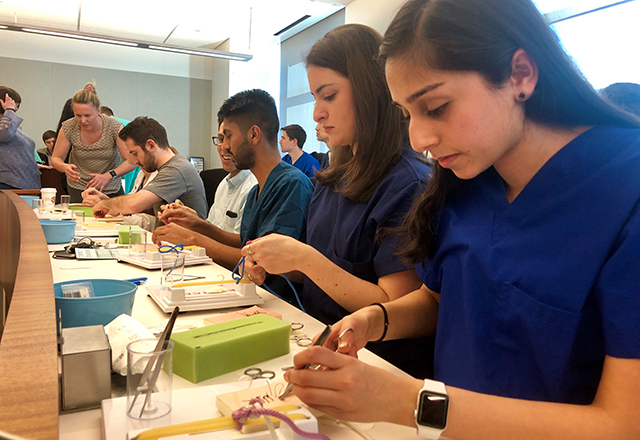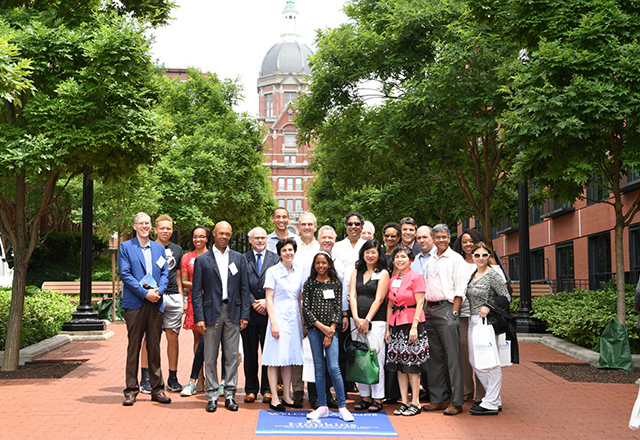Ways to Give

The story of Johns Hopkins is — at its heart — a story of philanthropy. Both the Johns Hopkins University and the Johns Hopkins Hospital and Health System owe their existence and their continuing excellence to the generosity of private individuals. While charitable gifts are extremely important to our institution, they also provide our benefactors with many rewards. The joy and satisfaction of giving to a cause they believe in, along with seeing how their gift leads to positive change are paramount benefits to our donors.
Gift Planning Options
Gift Planning allows you to proactively learn about the variety of options available to support Johns Hopkins. We welcome the opportunity to discuss strategies best suited to help you achieve your philanthropic goals and interests—using strategies that can even take advantage of some of the current economic challenges. Read below for some of our most popular options, or visit the Johns Hopkins University Office of Gift Planning.
-
-
You may choose to give appreciated stocks, bonds and/or mutual fund shares that you have held for more than one year. You will pay no capital gains tax on the transaction. Also, you will be able to claim a federal income tax charitable deduction for the full, appreciated value of the securities, up to 30 percent of your adjusted gross income. If the gift exceeds this limit, you may carry over the excess deduction for up to five additional years.The benefits vary depending on the type of gift, but all life-income gifts have the following attractive features:
- income for life or a term of years is paid to you and/or to another beneficiary, such as a spouse;
- increased income, if a gift is made to fund a life income plan that produces a higher yield than the donated asset is producing;
- an immediate federal income tax charitable deduction is available for a portion of the value of the gift; and
- favorable treatment of capital gains, if the asset given is in the form of securities or real estate that have appreciated in value.
-
 A charitable lead trust gives you the opportunity to simultaneously generate benefits for you, your family, and Johns Hopkins. You transfer property to the trust, which pays a percentage of the value of the trust assets to Johns Hopkins. When the trust term ends, the remaining assets, including any appreciation in assets, return to either you or your designated heirs at greatly reduced gift-tax and estate-tax rates. Depending on the structure of the trust, you may be allowed an income-tax, gift-tax or estate-tax charitable deduction.
A charitable lead trust gives you the opportunity to simultaneously generate benefits for you, your family, and Johns Hopkins. You transfer property to the trust, which pays a percentage of the value of the trust assets to Johns Hopkins. When the trust term ends, the remaining assets, including any appreciation in assets, return to either you or your designated heirs at greatly reduced gift-tax and estate-tax rates. Depending on the structure of the trust, you may be allowed an income-tax, gift-tax or estate-tax charitable deduction. -
 You may want to make a substantial gift to Johns Hopkins, but feel you cannot afford to lose the annual income produced by an asset. Our life-income gift program, which includes charitable gift annuities and charitable remainder trusts, offers ways to make a gift while also providing an income for your lifetime or for a term of years.
You may want to make a substantial gift to Johns Hopkins, but feel you cannot afford to lose the annual income produced by an asset. Our life-income gift program, which includes charitable gift annuities and charitable remainder trusts, offers ways to make a gift while also providing an income for your lifetime or for a term of years.The benefits vary depending on the type of gift, but all life-income gifts have the following attractive features:
- income for life or a term of years is paid to you and/or to another beneficiary
- increased income, if a gift is made to fund a life income plan that produces a higher yield than the donated asset is producing
- an immediate federal income tax charitable deduction is available for a portion of the value of the gift
- favorable treatment of capital gains, if the asset given is in the form of securities or real estate that have appreciated in value.
Bequests via qualified retirement accounts are particularly appealing since these assets are among the highest taxed assets in your estate. Non-charity beneficiaries would generally have to pay income tax on distributions, and these accounts may be subject to estate taxes and generation-skipping taxes. The total tax bill could exceed 80 percent! A charitable estate designation for Johns Hopkins is a tax-free benefit for our future.
To assure that your wishes are fulfilled, please contact us for suggested bequest language and for other information before finalizing bequest plans.
-
 Almost any kind of real property can be used to make a gift to Johns Hopkins: a primary residence, vacation home, farm, commercial building or an undeveloped parcel of land. Gifts can be outright, fund a life-income gift, create a life estate (contribute a residence now and reside in it for the rest of your life) or bequeathed. Gifts of real estate provide many of the same benefits as other assets: charitable deductions, capital gain avoidance, gift and estate tax reductions, diversification and the opportunity to reach your charitable goals and financial goals.
Almost any kind of real property can be used to make a gift to Johns Hopkins: a primary residence, vacation home, farm, commercial building or an undeveloped parcel of land. Gifts can be outright, fund a life-income gift, create a life estate (contribute a residence now and reside in it for the rest of your life) or bequeathed. Gifts of real estate provide many of the same benefits as other assets: charitable deductions, capital gain avoidance, gift and estate tax reductions, diversification and the opportunity to reach your charitable goals and financial goals. -
 The term "bequest" usually refers to a statement in your written Will of your wishes to provide charitable funding for Hopkins after your death. It is also common, however, to provide similar charitable designations through a retirement plan or IRA, life insurance, revocable and irrevocable trusts – even government savings bonds. Your bequest can be unrestricted or restricted to a specific purpose such as a scholarship endowment, a specific department or an area of research.
The term "bequest" usually refers to a statement in your written Will of your wishes to provide charitable funding for Hopkins after your death. It is also common, however, to provide similar charitable designations through a retirement plan or IRA, life insurance, revocable and irrevocable trusts – even government savings bonds. Your bequest can be unrestricted or restricted to a specific purpose such as a scholarship endowment, a specific department or an area of research.Bequests via qualified retirement accounts are particularly appealing since these assets are among the highest taxed assets in your estate. Non-charity beneficiaries would generally have to pay income tax on distributions, and these accounts may be subject to estate taxes and generation-skipping taxes. The total tax bill could exceed 80 percent! A charitable estate designation for Johns Hopkins is a tax-free benefit for our future.
To assure that your wishes are fulfilled, please contact us for suggested bequest language and for other pertinent information, before finalizing bequest plans.
To learn more about how a gift may be structured to your individual needs, or for a booklet describing how to incorporate life-income arrangements into your estate planning, call us at 410-361-6561 or 888-546-1336 (toll free), or write to:
The Johns Hopkins School of Medicine750 East Pratt Street, Suite 1700
Baltimore, MD 21202
Email: [email protected]
